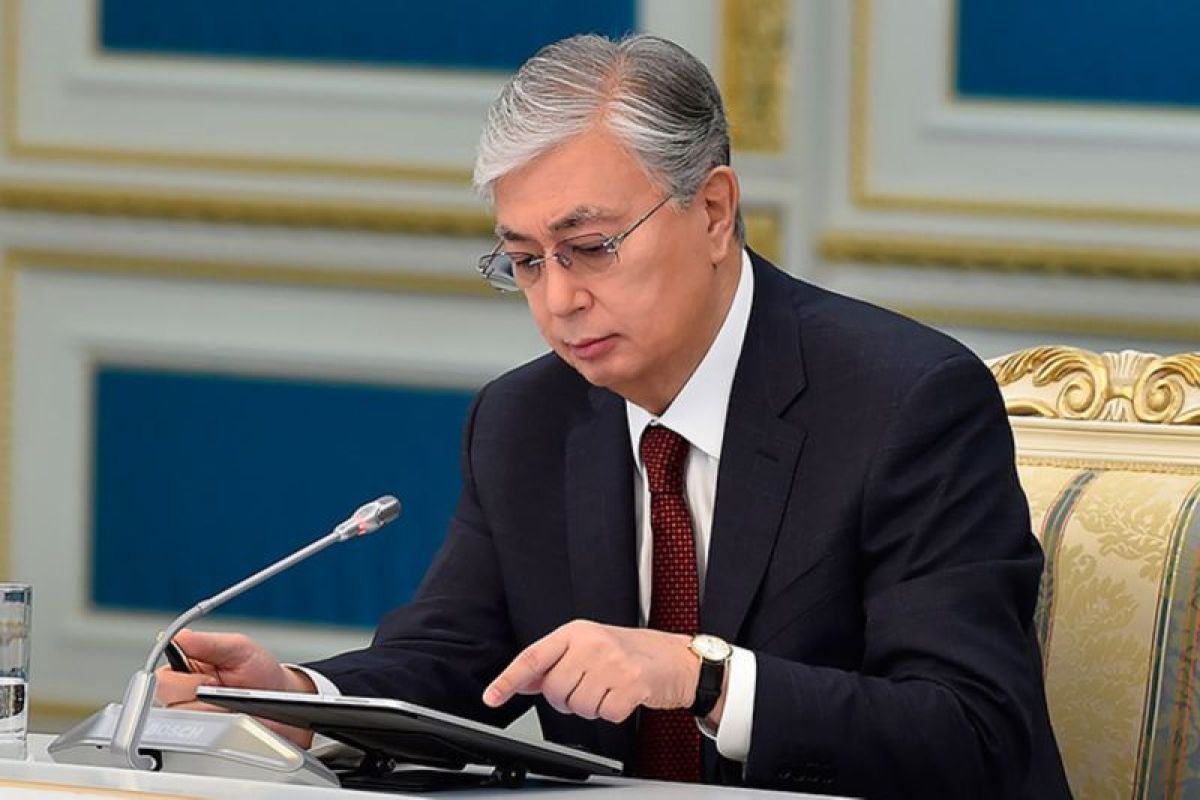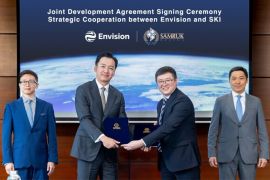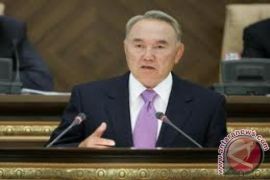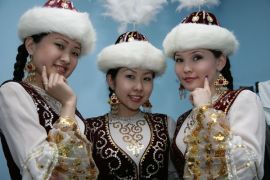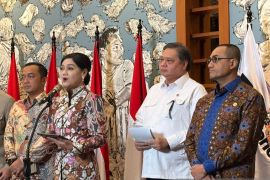Over the year, the President conducted working trips to 11 regions of the country, visiting more than 60 industrial and socio-cultural sites and engaging directly with residents.
Furthermore, he participated in 41 major events, including forums, meetings, and sessions, and held 137 discussions with political and public figures nationwide.
In terms of the regulatory and legal sphere, the statistics are equally impressive.
Throughout the year, the Head of State reviewed and signed a total of 3,979 documents, including 95 laws, 319 decrees, 81 orders, 28 meeting protocols, and 3,456 official documents (as of December 25, 2024).
On the international stage, 2024 was particularly dynamic. Kassym-Jomart Tokayev made 23 foreign visits and participated in 19 multilateral forums and summits.
During these international events, the President held 27 meetings with foreign leaders, 84 meetings with heads of state, government officials, and other high-ranking representatives, as well as leaders of international and regional organizations and business representatives. President Tokayev also received credentials from 22 foreign ambassadors and held 49 phone conversations with leaders of foreign countries.
The year began with positive transformations in Kazakhstan. On January 9, the President signed a decree modifying the administrative-territorial structure of the Almaty region, designating the township of Zhetygen as the city of Alatau.
This initiative set the stage for the development of Alatau City, a major urban project to be constructed between the cities of Almaty and Konayev in the coming years. The project has already attracted substantial interest from foreign investors.
During his visit to Singapore this year, the President met with potential investors to discuss the prospects of transforming the Almaty agglomeration into a free economic zone.
Kurultai proclaimed a new ideology
The Atyrau region was deliberately selected as the venue for the third meeting of the National Kurultai, given its historical significance as the location of the ancient city of Saraishyk.
During this Kurultai, key values shaping the identity of our nation were emphasized: independence and patriotism, unity and solidarity, justice and responsibility, law and order, diligence and professionalism, as well as creation and innovation.
A law was enacted to safeguard women's rights and enhance the protection of children, strengthening criminal accountability for domestic violence and ensuring the safety of children.
Additionally, a law to combat human trafficking was signed. Legislative amendments were also made to tighten penalties for vandalism and public disorder, reduce gambling addiction, and ban vapes. Members of the National Kurultai actively engaged with members of Parliament in drafting these crucial legal reforms.
Example of unbreakable unity
As you are aware, the massive spring floods caused extensive damage to the country and its people. A state of emergency was declared at the local level in 10 regions. The President responded promptly to this crisis, ordering the evacuation of residents to safe areas and ensuring they received the necessary assistance.
Kassym-Jomart Tokayev personally visited three of the hardest-hit regions (West Kazakhstan, North Kazakhstan, and Kostanay) where he met with local residents, listened to their concerns, and addressed their needs.
No one was left without support. The state fulfilled all its obligations, providing both material and financial assistance to everyone affected.
In particular, commissions operating in the flood-affected regions inspected 19,359 homes and cottages.
To ensure housing for displaced citizens, 5,767 residential homes were purchased on the real estate market, and repair work was fully completed in 9,156 houses. A total of 54.7 billion tenge was allocated for these efforts. Additionally, 2,680 new private houses were constructed in record time, at a cost of 64 billion tenge.
Furthermore, 36,455 families received one-time social aid amounting to 100 MCI (Monthly Calculated Index), totaling
13.3 billion tenge. Another 21,876 families received compensation of up to 150 MCI, amounting to 9.9 billion tenge.
Support for businesses affected by the floods was also a priority, with 12.1 billion tenge allocated for recovery efforts. An additional 2.5 billion tenge was provided by the corporate fund “Demeu” to the Atyrau, West Kazakhstan, and North Kazakhstan regions for payments to affected economic entities. These funds supported
40 requests from small and medium-sized enterprises. In total, regional commissions approved applications from
734 entrepreneurs, providing financial aid amounting to 14.6 billion tenge.
The amount of state aid allocated to compensate for livestock losses exceeded 2.8 billion tenge.
It is encouraging that, in this critical moment, our people demonstrated unity and solidarity.
Related news: Kazakhstan reaffirms commitment to citizen safety, fiscal reforms
Growth of trader turnover
At the expanded Government meeting held on February 7, the Head of State outlined key measures to ensure the freedom of entrepreneurship.
These included fostering competition, reducing state involvement in the economy, and lowering business costs. On May 10, Kassym-Jomart Tokayev signed a decree titled “On Measures for the Liberalization of the Economy”.
In September, the President outlined the key priorities for the country’s economic development in the near future. The government actively worked on implementing these tasks throughout the year.
As a result, in the first half of 2024, the gross inflow of foreign direct investments (FDI) reached $9.8 billion. The largest volumes of FDI were recorded in the mining industry, wholesale and retail trade, and manufacturing.
Between January and November 2024, the volume of investments in fixed capital amounted to 15.8 trillion tenge.
To date, 134 projects have been launched, representing a total investment of approximately 795.9 billion tenge and creating 10,100 permanent jobs. During his working trips to the regions, the Head of State visited several newly established large enterprises.
Expansion of transport and logistics links
The outgoing year has undoubtedly been a milestone for the development of Kazakhstan’s transport and transit potential. On February 28, President Kassym-Jomart Tokayev inaugurated the opening of the Transport and Logistics Center in Xi’an, China, via teleconference.
Approximately 40% of container trains from China to the European Union are dispatched from this location. Kazakhstan’s terminal in Xi’an’s dry port, with a design capacity exceeding 66,500 TEU (twenty-foot equivalent units) per year, offers Kazakh exporters access to new markets, significantly reduces delivery times, and strengthens Kazakhstan’s position as a reliable transit hub in Eurasia.
On July 3, Kassym-Jomart Tokayev and Xi Jinping participated in a teleconference ceremony to launch freight trucks and rail containers along the Trans-Caspian International Transport Route.
This route connects China, Kazakhstan, the Caspian Sea, Azerbaijan, Georgia, and onward to Europe. It is poised to become a highly efficient transport corridor, both economically and in terms of delivery speed. Additionally, agreements with Uzbekistan were reached to expand bilateral transport and transit capacities and to develop the Trans-Afghan route.
Moreover, 1,400 kilometeres of railway tracks have been repaired, and ongoing projects aim to repair and construct 12,000 kilometers of roads nationwide. Key international corridors are being launched, including Taldykorgan–Ust-Kamenogorsk, Karaganda–Almaty, and Aktobe–Atyrau–Astrakhan.
It is worth to mention the construction of the bridge over the Bukhtarma Reservoir upon the Head of State’s instruction. This long-awaited project, now completed and operational, represents new opportunities for residents of East Kazakhstan. The bridge enhances connectivity with the regional center for residents of the Markakol and Kurchum districts, who previously relied on ferry crossings to traverse the water.
The international development institutions have shown great interest in financing Kazakhstan’s road infrastructure projects. For example, the World Bank has allocated $650 million for Kazakhstan’s project under the Transport Resilience and Connectivity Enhancement Program (TRACE). These investments will support the development of the Middle Corridor, including the repair of the Zhezkazgan-Karaganda highway. Additionally, the Asian Development Bank will fund the construction of the Kyzylorda-Zhezkazgan highway with an investment exceeding $300 million.
Socially significant projects
Under the directive of the Head of State, the national project “Comfortable School” is making significant progress, with 217 schools under construction to create 460,000 new student places in cities and rapidly growing settlements.
To date, 36 schools have been completed, providing education to approximately 43,000 students, 15 of which are located in rural areas. These efforts underscore the commitment to ensuring equal attention to both urban and rural areas in the development of educational infrastructure.
The national project “Modernization of Rural Healthcare” has been advancing steadily.
Thus far, 276 primary healthcare facilities have been constructed – 99 completed in 2023 and 177 in 2024. In 2025, 125 additional facilities are planned. Additionally, the modernization of 32 district hospitals is underway.
Related news: Kazakhstan's vision for a sustainable future
Record harvest
The President has placed a strong emphasis on enhancing the potential of Kazakhstan’s agro-industrial complex.
During his foreign visits, he actively promotes investment opportunities within this sector.
Despite the challenges posed by the spring floods, the country achieved a record grain harvest of 26.7 million tons this year.
This success is the result of systematic government support for farmers. Preferential loans for spring planting and harvest operations were offered at a 5% interest rate, with more than half a trillion tenge allocated for this purpose for the first time.
Reducing import dependence on essential food products remains a key task. Several projects have been implemented in this direction. A comprehensive plan for the development of breeding and seed production has been adopted, focusing on providing farmers with domestically produced seeds.
Additionally, 120 billion tenge has been allocated to renew 8–10% of the agricultural machinery fleet annually.
A preferential leasing program for domestically produced agricultural machinery, with an interest rate of 5% per year, has also been launched.
To improve the storage and delivery of food products, new warehouse and logistics complexes are being developed.
In the coming years, storage facilities with a capacity of 700,000 tons will be constructed.
This year, Kazakhstan hosted its inaugural agricultural workers’ forum, where key development tasks for the sector were outlined.
It was announced that a special law aimed at preserving and increasing the population of Kazakh horse breeds has been passed, and the government has been tasked with establishing an Institute of Horse Breeding.
Successful initiatives
Kassym-Jomart Tokayev declared 2025 the “Year of Working Professions,” launching an important initiative aimed at instilling the principles of “responsible citizenship” and “honest labor” in society.
As part of this initiative, a new healthcare-related law was introduced that not only defines the responsibilities of medical workers but also elevates their status and provides comprehensive protections as they perform their duties. This development has been warmly welcomed by the medical community. For the first time, the honorary title of “Kazakhstan’s Honored Doctor” was established, with several prominent medical professionals already receiving the accolade.
This year, many distinguished citizens were honored with state awards, a positive tradition that will continue next year. It reinforces the message that individuals who dedicate themselves to their work will always be held in high regard.
The Head of State also underscores the importance of fostering a knowledge- and technology-driven economy. This commitment was further demonstrated with the signing of a law on science and technological policy, which outlines key directions and mechanisms for technological development, including the integration of scientific achievements into production.
Cleanliness starts with each person
At the initiative of the President, the national ecological campaign “Taza Kazakhstan” was launched in April. In response to the spring floods, the President instructed regional akims (mayors) to prioritize cleaning and landscaping efforts.
Approximately 2.4 million people participated in the campaign. Hundreds of thousands of courtyards and public areas were cleaned, and over 900,000 tons of waste were collected.
Around 2.5 million seedlings were planted. Over 20,000 social facilities and 4,600 public spaces, parks, and squares were landscaped. Additionally, more than 5,000 historical and cultural heritage sites and 758 fountains were restored.
Over 5.8 million square meters of areas around rivers, lakes, and other water bodies, as well as more than 8.4 million meters of irrigation networks, were cleaned.
Momentous choice
On October 6, during the nationwide referendum on the construction of a nuclear power plant (NPP), the people made their choice. A total of 5,561,937 citizens, or 71.12% of those who voted, supported the construction of the NPP.
“This project will be the largest in the history of independent Kazakhstan. The construction of a nuclear power plant is a long-term initiative that will ensure sustainable progress for our country for decades to come. It will create opportunities for training a new generation of engineers and specialists across various fields. These benefits will be fully realized by our youth and future generations of Kazakhstan citizens,” said the President.
Following the referendum, Kassym-Jomart Tokayev discussed the construction of the NPP with President Emmanuel Macron during his official visit to France and with President Vladimir Putin during his visit to Kazakhstan. Negotiations are also underway with China. The implementation of this large-scale project, which will take several years, will be entrusted to an international consortium comprising leading companies with extensive experience in the nuclear industry.
Recently, the Head of State met with the Minister of Energy, Almasadam Satkaliyev, and instructed him to expedite the construction of the nuclear power plant.
International relations
This year, Kazakhstan chaired six international organizations: the Shanghai Cooperation Organization (SCO), the Organization of Turkic States (OTS), the Collective Security Treaty Organization (CSTO), the Islamic Organization for Food Security, the International Fund for Saving the Aral Sea, and co-chaired the One Water Summit in Riyadh alongside France. As an independent and sovereign state, Kazakhstan effectively promotes its interests in political, economic, and military security spheres.
Since the beginning of the year, the President has undertaken state visits to Qatar, Azerbaijan, Singapore, Tajikistan, Mongolia, France, and Hungary, as well as official visits to Italy, the Vatican, Armenia, Turkmenistan, and Serbia. Notably, some of these countries were visited by a Kazakh President for the first time in nearly 20 years, underscoring the Head of State’s focus on deepening engagement.
In addition to state and official visits, the President made working visits to 11 countries to participate in various international events. He also held talks with the leaders of 11 foreign states who visited Kazakhstan on different occasions.
Summits of prestigious organizations
In July, Astana hosted the 24th Shanghai Cooperation Organization (SCO) Summit under Kazakhstan’s chairmanship.
During this period, Kazakhstan organized approximately 150 events at various levels, expanding the organization’s legal framework with 60 new documents.
The number of international organizations partnering with the SCO also grew, and the Special Working Group on Investments resumed its activities.
Almaty was designated the cultural and tourism capital of the SCO for 2023-2024.
Kazakhstan also successfully chaired the Organization of Turkic States (OTS) this year, overseeing the organization of more than 80 events. One notable achievement during this period was the adoption of a unified Turkic alphabet.
A key highlight of the OTS’s activities was the 5th World Nomad Games, which took place over five days on the vast steppe. Approximately 2,500 athletes from 90 countries participated in these competitions.
Press relations
The Head of State has published a series of articles and given interviews to both domestic and foreign media. At the beginning of 2024, Egemen Qazaqstan newspaper featured a comprehensive interview in which the President addressed the country’s development prospects and provided a clear assessment of the January events.
Throughout the year, interviews with the Azerbaijani news agency APA, Armenpress (Armenia), and Xinhua (China), as well as articles in Renmin Ribao (China), Le Figaro (France), and Izvestia (Russia), were also published.
The President held two press briefings during the year, addressing pressing questions from journalists.
Following the national referendum on the construction of the nuclear power plant (NPP), he held a briefing with domestic media representatives. Additionally, on December 7, during a panel session at the Doha Forum in a Newsmaker Interview format, the President answered questions posed by CNN journalist Julia Chatterley.
Of course, it is impossible to fully encapsulate the scale of the work accomplished in a single article. However, this analysis highlights some of the key events that have left a lasting impact on the country’s development history.
*) Berik Uali is Advisor, Press Secretary of the President of the Republic of Kazakhstan.
The views and opinions expressed on this page are those of the author and do not necessarily reflect the official policy or position of ANTARA News Agency.
Copyright © ANTARA 2024
